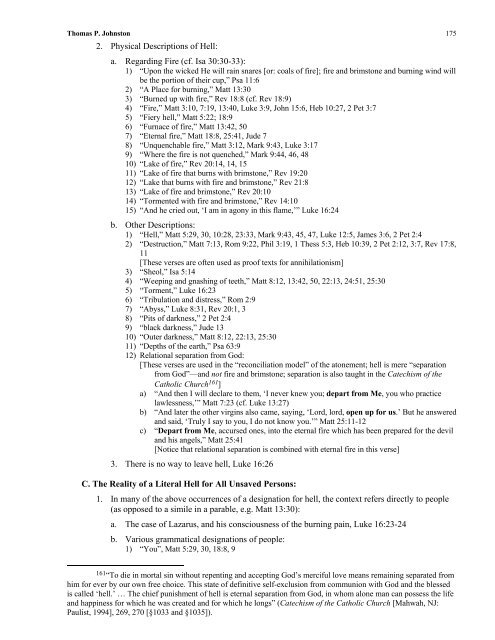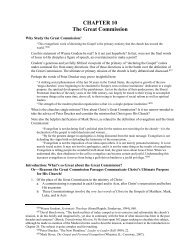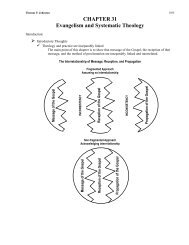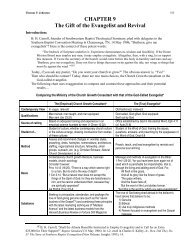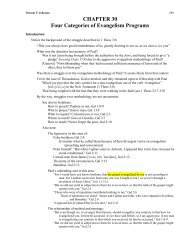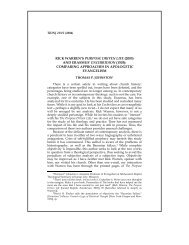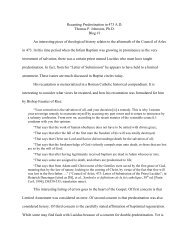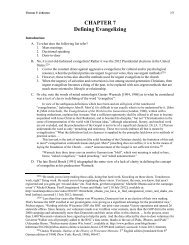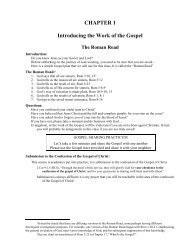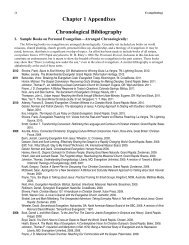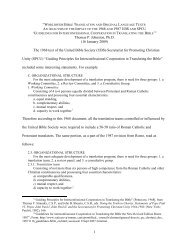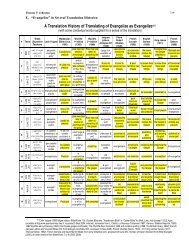Motivations and Urgency of Evangelism - Evangelism Unlimited
Motivations and Urgency of Evangelism - Evangelism Unlimited
Motivations and Urgency of Evangelism - Evangelism Unlimited
You also want an ePaper? Increase the reach of your titles
YUMPU automatically turns print PDFs into web optimized ePapers that Google loves.
Thomas P. Johnston 175<br />
2. Physical Descriptions <strong>of</strong> Hell:<br />
a. Regarding Fire (cf. Isa 30:30-33):<br />
1) “Upon the wicked He will rain snares [or: coals <strong>of</strong> fire]; fire <strong>and</strong> brimstone <strong>and</strong> burning wind will<br />
be the portion <strong>of</strong> their cup,” Psa 11:6<br />
2) “A Place for burning,” Matt 13:30<br />
3) “Burned up with fire,” Rev 18:8 (cf. Rev 18:9)<br />
4) “Fire,” Matt 3:10, 7:19, 13:40, Luke 3:9, John 15:6, Heb 10:27, 2 Pet 3:7<br />
5) “Fiery hell,” Matt 5:22; 18:9<br />
6) “Furnace <strong>of</strong> fire,” Matt 13:42, 50<br />
7) “Eternal fire,” Matt 18:8, 25:41, Jude 7<br />
8) “Unquenchable fire,” Matt 3:12, Mark 9:43, Luke 3:17<br />
9) “Where the fire is not quenched,” Mark 9:44, 46, 48<br />
10) “Lake <strong>of</strong> fire,” Rev 20:14, 14, 15<br />
11) “Lake <strong>of</strong> fire that burns with brimstone,” Rev 19:20<br />
12) “Lake that burns with fire <strong>and</strong> brimstone,” Rev 21:8<br />
13) “Lake <strong>of</strong> fire <strong>and</strong> brimstone,” Rev 20:10<br />
14) “Tormented with fire <strong>and</strong> brimstone,” Rev 14:10<br />
15) “And he cried out, ‘I am in agony in this flame,’” Luke 16:24<br />
b. Other Descriptions:<br />
1) “Hell,” Matt 5:29, 30, 10:28, 23:33, Mark 9:43, 45, 47, Luke 12:5, James 3:6, 2 Pet 2:4<br />
2) “Destruction,” Matt 7:13, Rom 9:22, Phil 3:19, 1 Thess 5:3, Heb 10:39, 2 Pet 2:12, 3:7, Rev 17:8,<br />
11<br />
[These verses are <strong>of</strong>ten used as pro<strong>of</strong> texts for annihilationism]<br />
3) “Sheol,” Isa 5:14<br />
4) “Weeping <strong>and</strong> gnashing <strong>of</strong> teeth,” Matt 8:12, 13:42, 50, 22:13, 24:51, 25:30<br />
5) “Torment,” Luke 16:23<br />
6) “Tribulation <strong>and</strong> distress,” Rom 2:9<br />
7) “Abyss,” Luke 8:31, Rev 20:1, 3<br />
8) “Pits <strong>of</strong> darkness,” 2 Pet 2:4<br />
9) “black darkness,” Jude 13<br />
10) “Outer darkness,” Matt 8:12, 22:13, 25:30<br />
11) “Depths <strong>of</strong> the earth,” Psa 63:9<br />
12) Relational separation from God:<br />
[These verses are used in the “reconciliation model” <strong>of</strong> the atonement; hell is mere “separation<br />
from God”—<strong>and</strong> not fire <strong>and</strong> brimstone; separation is also taught in the Catechism <strong>of</strong> the<br />
Catholic Church 161 ]<br />
a) “And then I will declare to them, ‘I never knew you; depart from Me, you who practice<br />
lawlessness,’” Matt 7:23 (cf. Luke 13:27)<br />
b) “And later the other virgins also came, saying, ‘Lord, lord, open up for us.’ But he answered<br />
<strong>and</strong> said, ‘Truly I say to you, I do not know you.’” Matt 25:11-12<br />
c) “Depart from Me, accursed ones, into the eternal fire which has been prepared for the devil<br />
<strong>and</strong> his angels,” Matt 25:41<br />
[Notice that relational separation is combined with eternal fire in this verse]<br />
3. There is no way to leave hell, Luke 16:26<br />
C. The Reality <strong>of</strong> a Literal Hell for All Unsaved Persons:<br />
1. In many <strong>of</strong> the above occurrences <strong>of</strong> a designation for hell, the context refers directly to people<br />
(as opposed to a simile in a parable, e.g. Matt 13:30):<br />
a. The case <strong>of</strong> Lazarus, <strong>and</strong> his consciousness <strong>of</strong> the burning pain, Luke 16:23-24<br />
b. Various grammatical designations <strong>of</strong> people:<br />
1) “You”, Matt 5:29, 30, 18:8, 9<br />
161 “To die in mortal sin without repenting <strong>and</strong> accepting God’s merciful love means remaining separated from<br />
him for ever by our own free choice. This state <strong>of</strong> definitive self-exclusion from communion with God <strong>and</strong> the blessed<br />
is called ‘hell.’ … The chief punishment <strong>of</strong> hell is eternal separation from God, in whom alone man can possess the life<br />
<strong>and</strong> happiness for which he was created <strong>and</strong> for which he longs” (Catechism <strong>of</strong> the Catholic Church [Mahwah, NJ:<br />
Paulist, 1994], 269, 270 [§1033 <strong>and</strong> §1035]).


